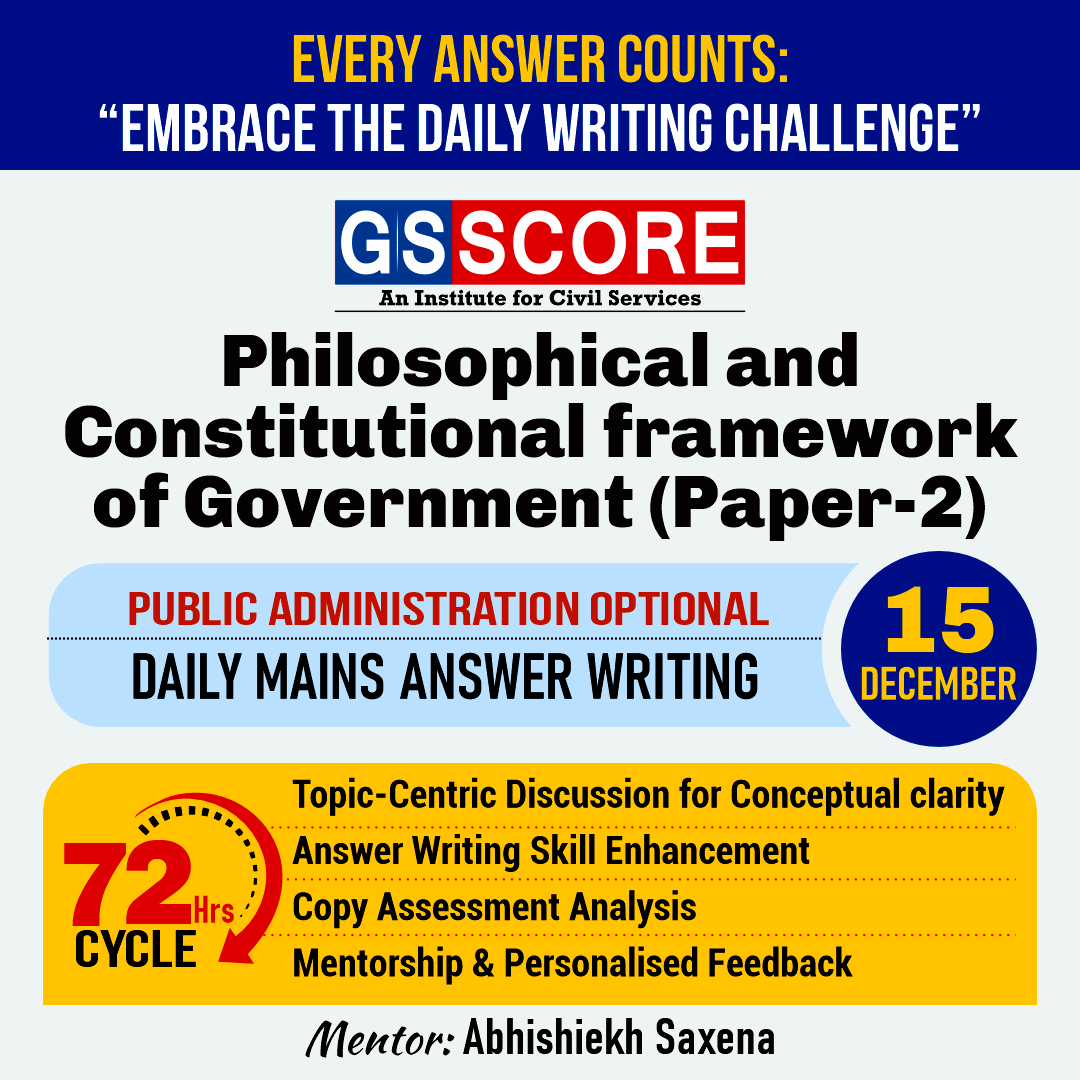

Public Administration Optional (Philosophical and Constitutional framework of Government) by Abhishiekh Saxena

Instruction:
- There will be 2 questions carrying the First Question is-10 marks Write your answers in 150 words and the Second Question is-15 marks Write your answers in 250 words.
- Any page left blank in the answer-book must be crossed out clearly.
- Evaluated Copy will be re-uploaded on the same thread after 2 days of uploading the copy.
- Discussion of the question and one to one answer improvement session of evaluated copies will be conducted through Google Meet with concerned faculty. You will be informed via mail or SMS for the discussion.
Question #1. “The framing of a Constitution calls for the highest statecraft”. -Justice Khanna. Comment on the basic philosophy of Indian Constitution. 10 marks (150 words)
Question #2. The nature of the relationship between bureaucracy and democracy is simultaneously paradoxical and complementary in nature. Comment. 15 marks (250 words)
(Examiner will pay special attention to the candidate's grasp of his/her material, its relevance to the subject chosen, and to his/ her ability to think constructively and to present his/her ideas concisely, logically and effectively).
STEPS & INSTRUCTIONS for uploading the answers
Step 1 - The Question for the day is provided below these instructions. It will be available at 7:00 AM.
Step 2 - Uploading of Answers : Write the answer in A4 Sheet leaving proper margins for comments and feedback and upload the PDF in MY ACCOUNT section. Click on the option of SUBMIT COPY to upload the PDF.
Step 3 - Deadline for Uploading Answers: The students shall upload their answers by 7:00 PM in the evening same day. The first 50 copies will be evaluated.
Step 4 - Feedback : Mentors will give their feedback for the answers uploaded. For more personalised feedback, join our telegram channel by clicking on the link https://t.me/mains_answer_writing_cse . A one-to-one session will be conducted with the faculty after copy evaluation in 72 Hrs.
Model Answer
Question #1. “The framing of a Constitution calls for the highest statecraft”. -Justice Khanna. Comment on the basic philosophy of Indian Constitution. 10 marks (150 words)
Approach:
- Quote justice Khanna and elaborate on the basic philosophy with special emphasis on founding fathers.
Justice H. R. Khanna in his ‘Making of Constitution said: “The framing of a Constitution calls for the highest statecraft. Those entrusted with it have to realize the practical needs of the government and have, at the same time, to keep in view the ideals, which have inspired the nation. They have to be men of vision, yet they cannot forget the grass roots”. A Constitution at the same time has to be a living thing, living not for one or two generations but for succeeding generations of men and women. It is for that reason the provisions of the Constitution are couched in general terms, for the great generalities the Constitution have a content and significance that vary from age to age and have, at the same time transcendental continuity about them. …A constitution states, or ought to state, not the rules of the passing hour, but the principles for an expanding future.
The Indian Constitution is based on the philosophy of evolving an egalitarian society free from fear and bias based on promoting individual freedom in shaping the government of their choice. The whole foundation of constitutional democracy is building a system of governance in systematic machinery functioning automatically on the wheels of norms and regulations but not on individual whims and fancies. It is easy to dream such a system of rule of law than framing a mechanism for it.
The Indian Constitution is a marathon effort to translate philosophical rule of law into practical set up divided into three significant estates checking each other exercising parallel sovereignty and non-egoistic supremacy in their own way. Apart from excellent separation of powers to avoid the absolute concentration, the Constitution of India envisages a distinct distribution of powers between two major levels of Governments- central and provincial with a fair scope for a third tier – the local bodies. However, the operation of the system came in contrast with men and their manipulations leading to different opinions and indifferent options. Whatever may be the consequential aberrations, the system of rule of law is perfectly reflected in framing of the Constitutional norms codifying the best governing mechanisms tested and trusted in various democratic societies world over.
Question #2. The nature of the relationship between bureaucracy and democracy is simultaneously paradoxical and complementary in nature. Comment. 15 marks (250 words)
Approach:
- Shed light on both complementary and paradoxical character.
There exists a general lingering stereotype that comes to mind when one hears the term ‘Bureaucracy’. Some of the terms usually associated with a bureaucratic set up are inefficiency, corruption, and unaccountability. It appears to be the antithetical approach to ‘Democracy’. While Bureaucracy stands for a system of government in which most important decisions are taken by the state officials, rather than the elected representatives, a Democracy is a system of government wherein the citizens of a nation exercise power through elections.
The nature of the relationship between bureaucracy and democracy is simultaneously paradoxical and complementary in nature.
While the two may sound fundamentally different in approaches, together they constitute essential elements of every society. In India, politicians are the democratically elected representatives, they are primarily responsible for the ‘law-making’ functions, while Bureaucrats are primarily responsible for the execution of policies. Thus, every effective democracy requires an efficient bureaucracy.
Bureaucrats, while not democratically elected by the people of a State, are instead appointed to effectively administer and execute public policy. Thus, unlike your average politicians, they are not directly responsible to the people.


